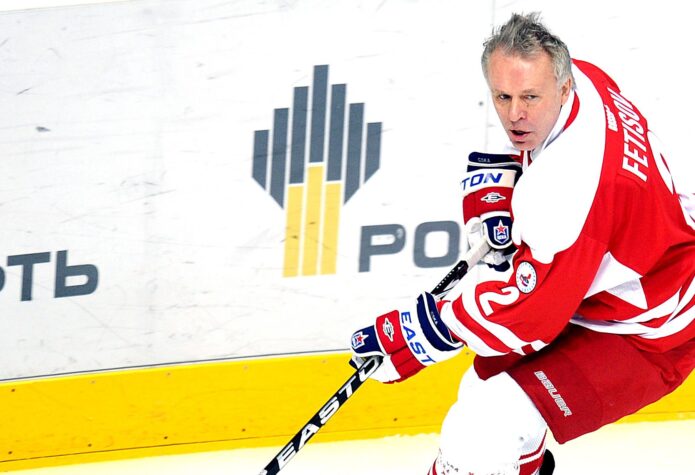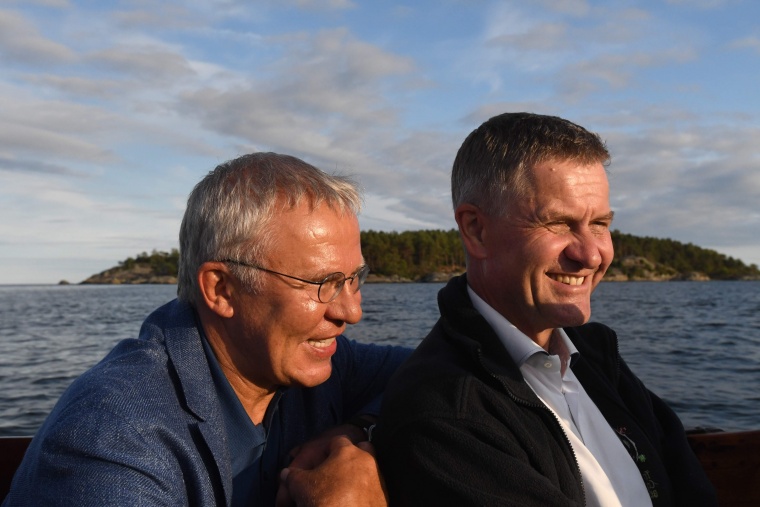Passionate about ice

“Ice hockey is a game of anticipation. If you cannot anticipate or prepare for something unusual from the opposition, then you cannot become a champion. It’s the same with climate change – you have to fight and prepare for it before it is too late”, says Viacheslav Fetisov, legendary Russian ice hockey player and UN Environment Patron for Polar Regions.
To raise global attention about the rapidly disappearing ice in the polar regions, the UN Environment Programme and Fetisov will be arranging the “last ice hockey game at the North Pole”, to be broadcast around the world in April 2019.
The symbolic event is a wake-up call to the world, highlighting climate models projecting that the Arctic Ocean will be ice-free by 2040. During the event, the teams will phone the United Nations Secretary-General from the North Pole. Erik Solheim, Executive Director of the UN Environment Programme, has previously stated that “[w]e simply cannot ignore the threat of climate change to the Arctic regions of our earth. Once this fragile ecosystem is disturbed, it may never recover.”
“I am grateful to see great athletes like Viacheslav Fetisov lending their names to this ‘last call for the Arctic’ and making the world aware that we have to take action. It is now or never.”
As one of the best defensemen in the history of world ice hockey, Fetisov won two medals at the Winter Olympics and was a two-time winner of the Stanley Cup with the Detroit Red Wings. In 2015, Fetisov was the first to support a campaign to establish a marine protected area in the Ross Sea in Antarctica. Since then, he has lent support to several environmental initiatives, including UN Environment Patron Lewis Pugh’s clean-up campaign for Lake Baikal in Russia, and the Antarctica 2020 campaign for the creation of more marine protected areas. In 2017, Fetisov arranged the largest beach clean-up in the Russian part of the Arctic.

Arendalsuka 2018: Viacheslav Fetisov and Erik Solheim Photo: GRID-Arendal/Peter Prokosch
NIB Newsletter met Viacheslav Fetisov during the Arendalsuka in Norway. He told us about his work to bring awareness to one of the earth’s most fragile ecosystems, warming at twice the average rate of the rest of the planet, potentially causing a rise in sea level, permafrost thawing, as well as floods and droughts.
How did you become aware of climate issues and the Arctic, and how did you get involved?
I will put it his way: most people still do not understand what is going on with climate change. I also belonged to this category a few years ago. Then, firstly, I met Lewis Pugh, who is an extreme swimmer who spent years swimming in the cold waters of the Arctic and Antarctica, just to bring it to people’s attention. We met in Moscow four years ago and became friends.
Then, I understood the situation and we started discussing how to get famous people to stress the problem, because the melting of the polar ice is going to happen so soon. People do not really think about it, not in the global North, nor in the rest of the world – but it is going to affect everybody.
I offered to play hockey at the North Pole to raise awareness along with celebrities – not only hockey players, but also athletes from different sports, politicians and actors. The plan is to get them on a team and to play the game and bring it to people’s attention.
You have previously mentioned your personal experience related to the climate from when you used to play as a kid in Moscow. Could you tell us about that?
I think this doesn’t only relate to Moscow, but rather to all the places where kids learnt how to skate outside, on the ponds or in the streets. In Moscow, in the 1970s, we could skate from October sometimes to late April. In the last few years, even on New Year’s Eve it rains. In my childhood, the winter temperature used to be -30 Celsius, but now you cannot skate outside anymore. This simple example can help explain what has happened in the world during the last 40 years, and thus bring attention to it.
How do you see the role of financing in the fight against climate change?
I will put it this way: if financial institutions do not think they are part of the solution, there will be no future for banking. It is going to affect the economy as well as everything else.
Let us talk about the game. We know that Wayne Gretzky is taking part and that some Swedish and Finnish players will join in. Can you already name a few more of the players?
During September, we will plan the logistics and settle the date before sending out invitations and talking to the people. I know there are many well-respected Swedish and Finnish players, and that is what we need: people who can talk to the nations and be part of this process. They are trusted and respected, and they can teach people about what is going to happen.
Hockey is a very intellectual game, and I know guys who would be on the same page with me. I have good connections with Teemu Selänne, Jari Kurri, Mats Sundin, Nicklas Lidström and Peter Forsberg. We played together for many, many years, and I think they are going to listen to me and respond.
Have you already found a place for the game?
We are coordinating this with the UN and UNEP. The game is supposed to take place in the Arctic Circle, in Barneo, some 90 kilometres from the North Pole.
We are also considering inviting scientists and Greenpeace in order to have them on board. As announced, there will be minimum damage to the environment in the North Pole. That is our goal, to minimize the damage and to bring a historic event to the region to stress probably the biggest challenge for humankind in the coming years.
Thinking about ice hockey, are there any lessons you can learn from it as a game and philosophy?
You know I grew up in the Soviet Union. In those times, we were fighting against the national teams of Finland, Sweden, Canada, the United States, and Czechoslovakia. We were enemies all the time, and we had no time to talk.
Later, I became a pioneer in opening the National Hockey League (NHL) up to Europeans. We started playing for the same team, and I became teammates with Finns, Swedes, Czechs, Slovak players, Canadians and Americans. We could fight together for the ultimate goal of winning, and after the game, we would go to have a beer and talk. That is a good example of how a sports team, especially hockey since it is a contact sport, can unite for the biggest challenge you can get.
That is why I am now building a team through the game at the North Pole. After that, we will continue to do different events in other parts of the world, and invite more and more people to join our team. World-famous, well-respected people, just to stress that we are facing one of the biggest problems very soon, as things happen so quickly. You cannot play ice hockey on grass or sand. That is why this game is a very symbolic and philosophical one.